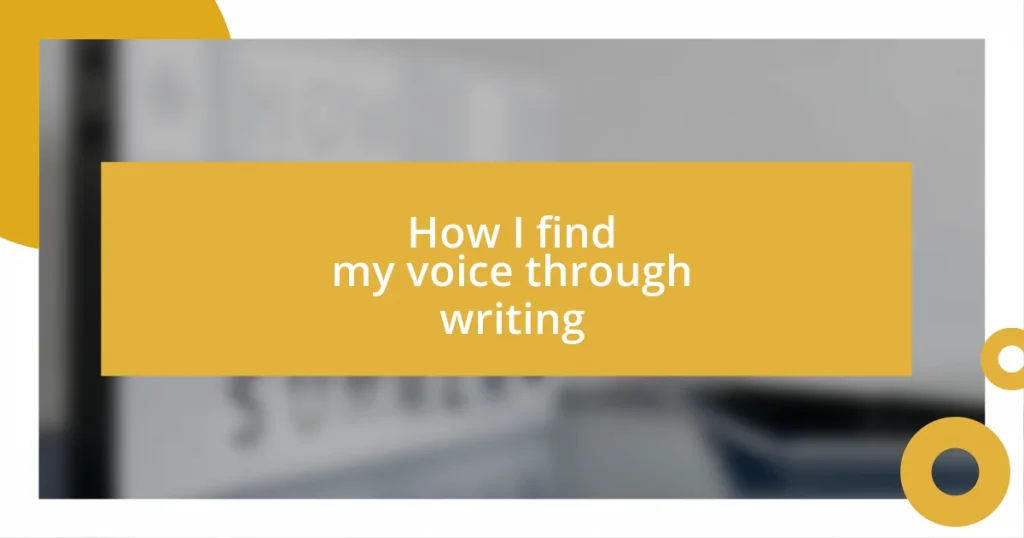Key takeaways:
- Voice in writing is unique to each individual, reflecting personality and emotions, and can foster a deep connection with readers through personal expression.
- Finding inspiration can come from nature, memories, and art, transforming experiences into narratives that resonate with others.
- Seeking feedback and engaging with a writing community promotes growth and evolution of voice, helping writers refine their style and deepen the emotional impact of their work.
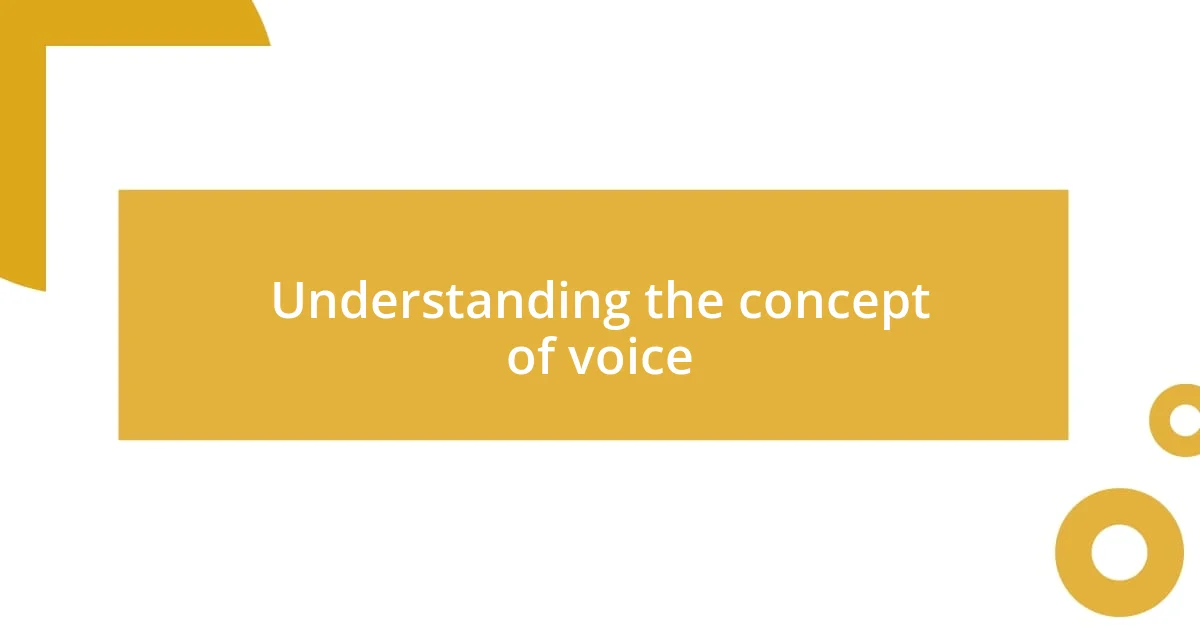
Understanding the concept of voice
Voice in writing is like a fingerprint; it’s unique to each writer and reveals our personality, beliefs, and emotions. I remember the first time I truly felt my voice emerge on the page—it was liberating. Have you ever felt that rush when the words just flow and resonate with your true self?
When I think about what voice encompasses, it goes beyond just style or tone; it reflects who we are. I often find myself asking, “What resonates with me?” This question guides my writing and helps me uncover layers of my identity. Voice can be a blend of experiences and emotions that connect readers to our narrative.
Understanding voice means embracing vulnerability. I still recall sharing a personal story that made me uncomfortable, yet it was the most genuine piece I’ve crafted. Isn’t it incredible how our voice can not only express our truths but also invite others into our world?
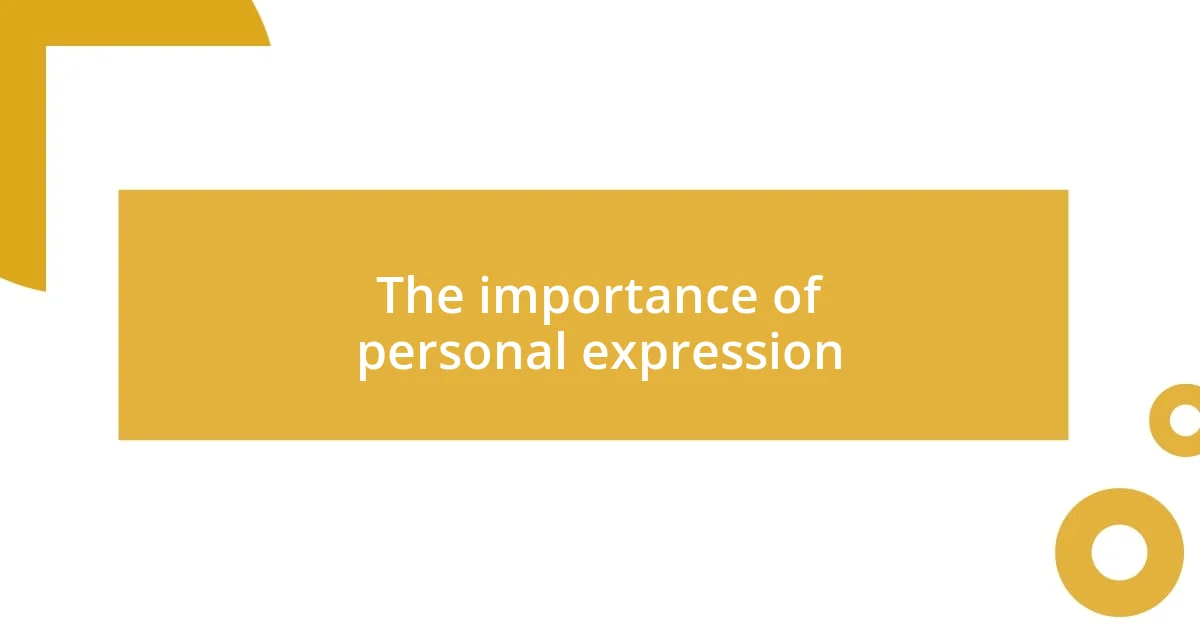
The importance of personal expression
Personal expression is essential in writing because it allows us to connect with others on a deeper level. When we share our thoughts, feelings, and experiences authentically, we create a bridge between our inner world and that of our readers. I recall a time when I wrote about my struggles with self-doubt; the feedback I received showed me that vulnerability could spark conversations and even healing for others.
- Personal expression fosters connection and community.
- It cultivates empathy by sharing relatable experiences.
- Writing authentically can inspire and empower both the writer and the reader.
- It encourages self-discovery and deeper understanding of one’s beliefs and values.
- Through expressive writing, we often find common ground with others.
Writing isn’t just about putting words on a page; it’s about sharing our unique narratives. I’ve found that when I pour my heart into my writing, it resonates with people in ways I never anticipated. That realization transformed my approach to writing. The importance of personal expression lies in its potential to unite us, revealing the shared human experience through each individual story.
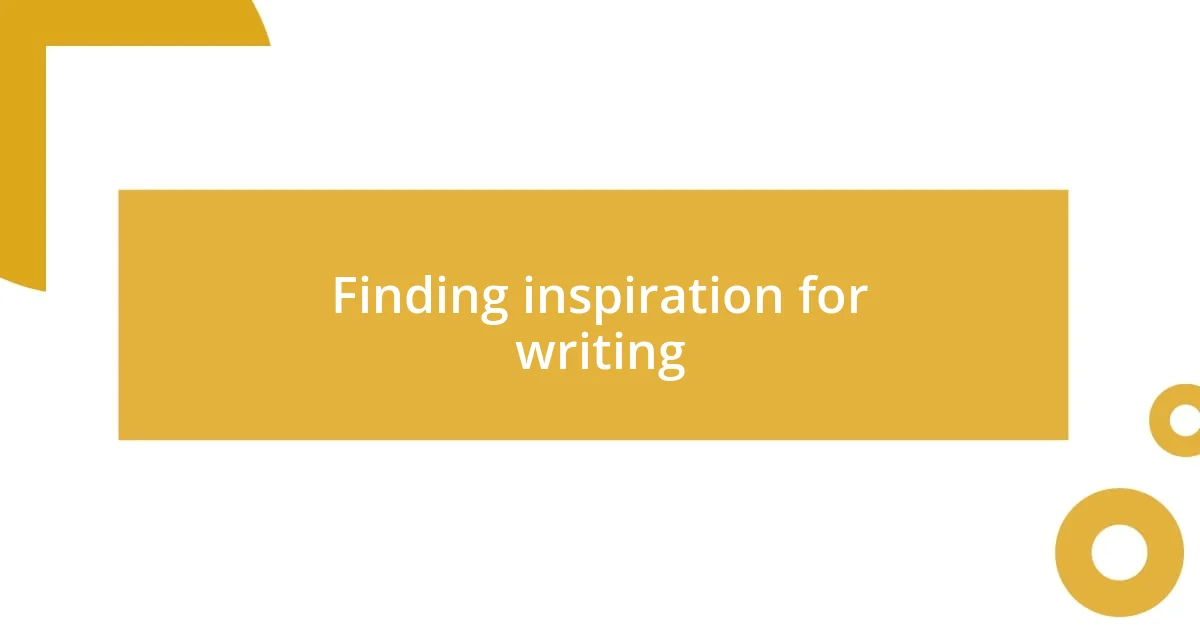
Finding inspiration for writing
Finding inspiration can sometimes feel elusive, like chasing shadows. I’ve discovered that nature often whispers stories to me. Each time I take a walk, I tune into the rustling leaves or the chatter of birds, and suddenly thoughts blossom into ideas. Have you ever noticed how a simple change of scenery can spark creativity? In those moments, my pen feels like a bridge connecting my heart to the world around me.
On the other hand, memories can also ignite inspiration. I often reflect on meaningful moments from my past—the first time I read a book that truly moved me or the laughter shared with friends over heartfelt stories. Each recollection brings a rush of emotions that I can translate into words. I find myself asking, “How can I capture this feeling?” and with that question, I dive deeper into my narrative. It’s as if each memory is a treasure trove filled with gems waiting to be polished into prose.
Sometimes, I also seek inspiration through art. A painting, a song, or a film can inspire whole essays in me. There was a time when a simple line from a song stuck in my head, echoing my thoughts. I soon found myself exploring themes of love and loss, weaving together lyrics with my own experiences. This intertwining of creativity has illuminated paths I didn’t know existed in my writing. How do you capture inspiration from the world around you?
| Source of Inspiration | Example/Experience |
|---|---|
| Nature | Inspired by a walk, writing flows like the rustling leaves. |
| Memories | Reflecting on laughter and stories leads to deeper narratives. |
| Art | A song lyric inspires themes of love and loss in my writing. |
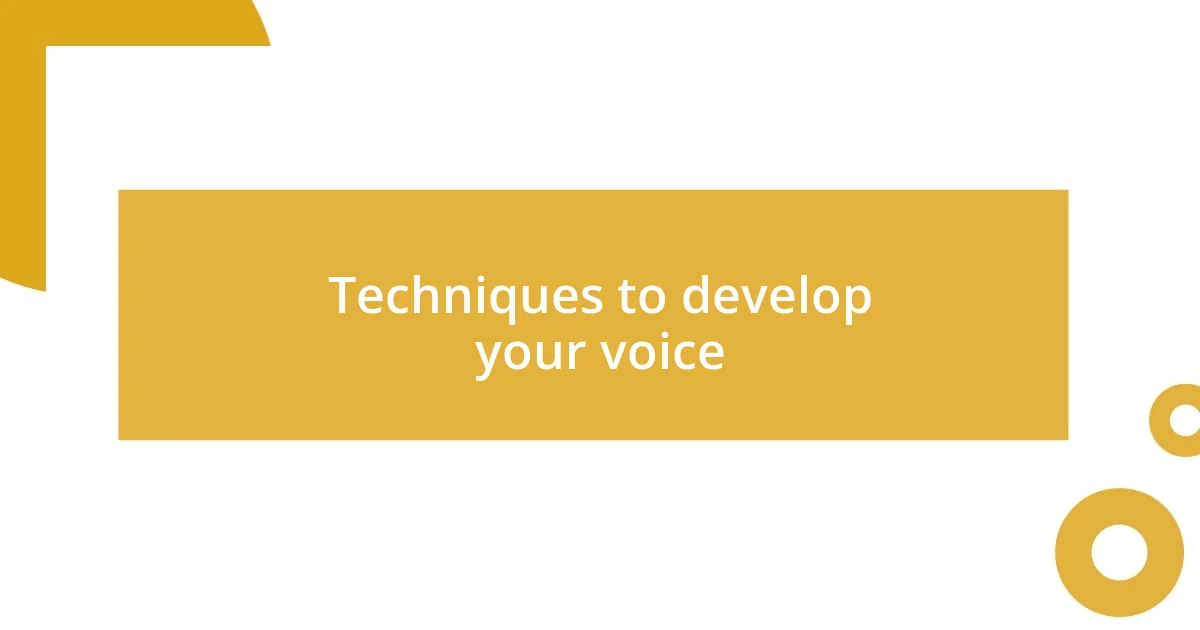
Techniques to develop your voice
Diving deep into your writing can reveal your authentic voice. One technique I’ve practiced is free writing, where I let my thoughts flow onto the page without overthinking. I remember a day when I set a timer for ten minutes and wrote about my morning. The result surprised me—a cascade of emotions and reflections emerged that I hadn’t even realized I was holding onto. Have you tried free writing to unearth your voice?
Another effective approach is to experiment with different styles and genres. I once wrote a humorous piece after a particularly challenging week. The act of infusing humor into my words provided relief and brought a new aspect of my voice to the forefront. It was liberating to step outside my comfort zone! What styles resonate with you? By blending genres or adopting a playful tone, you may discover facets of your voice that feel completely authentic.
Reading work by authors who inspire you can also strengthen your voice. I often find that exploring various writing styles opens my mind and fuels my creativity. I recall reading a memoir that impacted me profoundly; it encouraged me to write with more vulnerability in my own work. What changes do you notice in your approach after immersing yourself in diverse authors? This exchange of ideas might just push your voice to new heights.
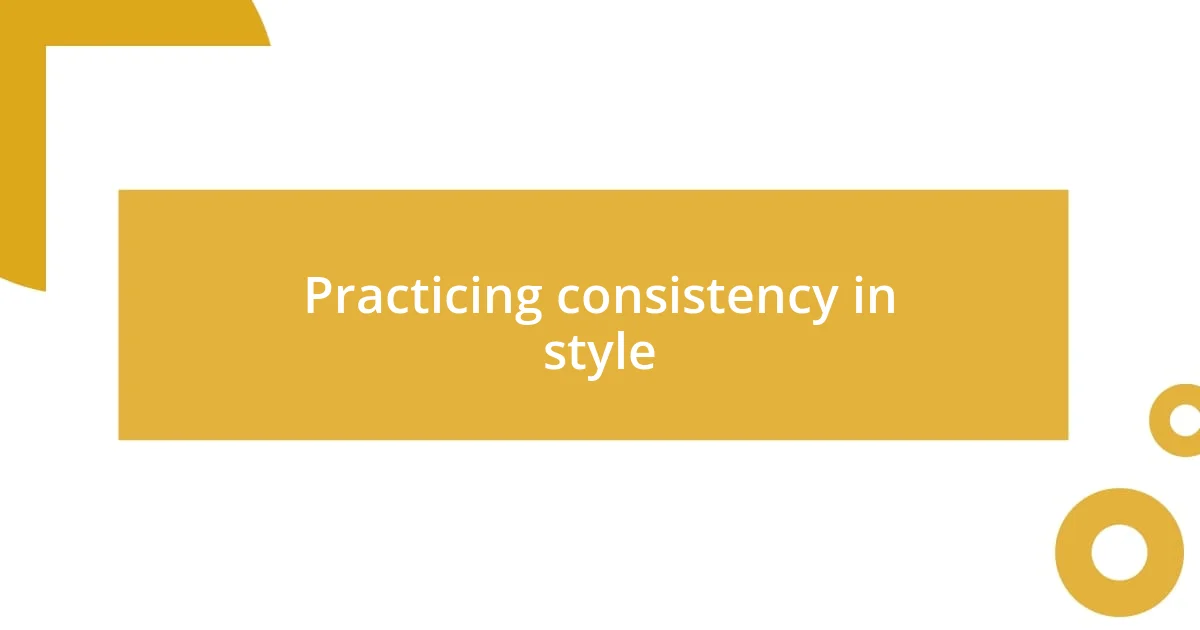
Practicing consistency in style
Practicing consistency in style is like finding the perfect rhythm in music. I remember the early days of my writing journey, where each piece seemed to take on a different persona. Some felt lyrical while others were stark and direct. I soon realized that honing a specific style helped my voice shine through. Have you ever looked back at your work and noticed a certain flow that resonates? Recognizing that pattern can be incredibly rewarding.
Experimenting within a consistent style has been a game-changer for me. For instance, when I decided to punctuate my prose with vivid imagery, it transformed the way I connected with my audience. One day, while writing about a serene river, I chose to describe not just its appearance but also the emotions it evoked in me. The result was a piece that felt cohesive and true to my voice. It’s fascinating how small adjustments can lead to a stronger, more recognizable style. How do you refine your voice to make sure it echoes throughout your writing?
In the pursuit of consistency, I’ve learned the value of personal guidelines. I often jot down key themes or tones I want to explore, creating a mini playbook for my writing. Having that reference helps me stay aligned with my voice—whether I’m in a reflective mood or tackling a heavier topic. It’s like having a map when navigating unknown territories. Have you ever considered crafting your writing principles? Establishing clear markers can guide you back to your authentic self when you veer off course.

Seeking feedback on your writing
Seeking feedback on your writing can be a transformative experience. I’ll never forget when I shared a short story with a close friend. The feedback was candid, highlighting emotional nuances I hadn’t noticed. Initially, I felt anxious about their opinions, but it was exhilarating to realize how their insights helped me deepen my characters’ relationships. Have you sought feedback from someone who understands your vision?
Receiving constructive criticism is essential for growth, but it can also be challenging. Once, during a writers’ workshop, I presented a piece that was deeply personal, and the critique was tough to digest. Yet, the process opened my eyes to the layers I could add to my narrative. It taught me that what feels polished to me may still have room for improvement. Have you ever found that criticism fuels your determination to carve out your unique voice?
Engaging with a writing community can expand your perspective on your work. Personally, I joined an online group where we exchanged our pieces regularly. The variety of voices and styles pushed me to rethink my approach. I remember one member’s comment that encouraged me to embrace more vulnerability, prompting me to infuse honesty into my writing. How might connecting with fellow writers help you refine your own voice?

Evolving your voice over time
Evolving your voice over time is an organic process that can feel both thrilling and daunting. I recall a period when I began experimenting with poetry. The weight of words became more significant for me, and I found myself exploring deeper emotions. Looking back, I can see how that shift sparked a dynamic change in my writing style, making it more profound and resonant. Have you ever noticed how your experiences can shape the way you express yourself?
As I grew more confident in my writing, I started to blend different genres, which completely reshaped my voice. For example, one day, I decided to infuse elements of narrative nonfiction into a personal essay. The result was a powerful personal story laced with factual richness. It felt liberating to marry the two styles; I was no longer confined to a single genre. What genres resonate with you that could breathe new life into your writing?
Sometimes, I find that my voice evolves not just through writing but also through life experiences. After a life transition, such as moving to a new city, my perspective shifted dramatically. I began to embrace a more adventurous tone in my writing, reflecting my newfound curiosity about the world. It’s incredible how the external environment can influence our inner voice. Have you ever experienced a change that prompted a shift in your writing style?









